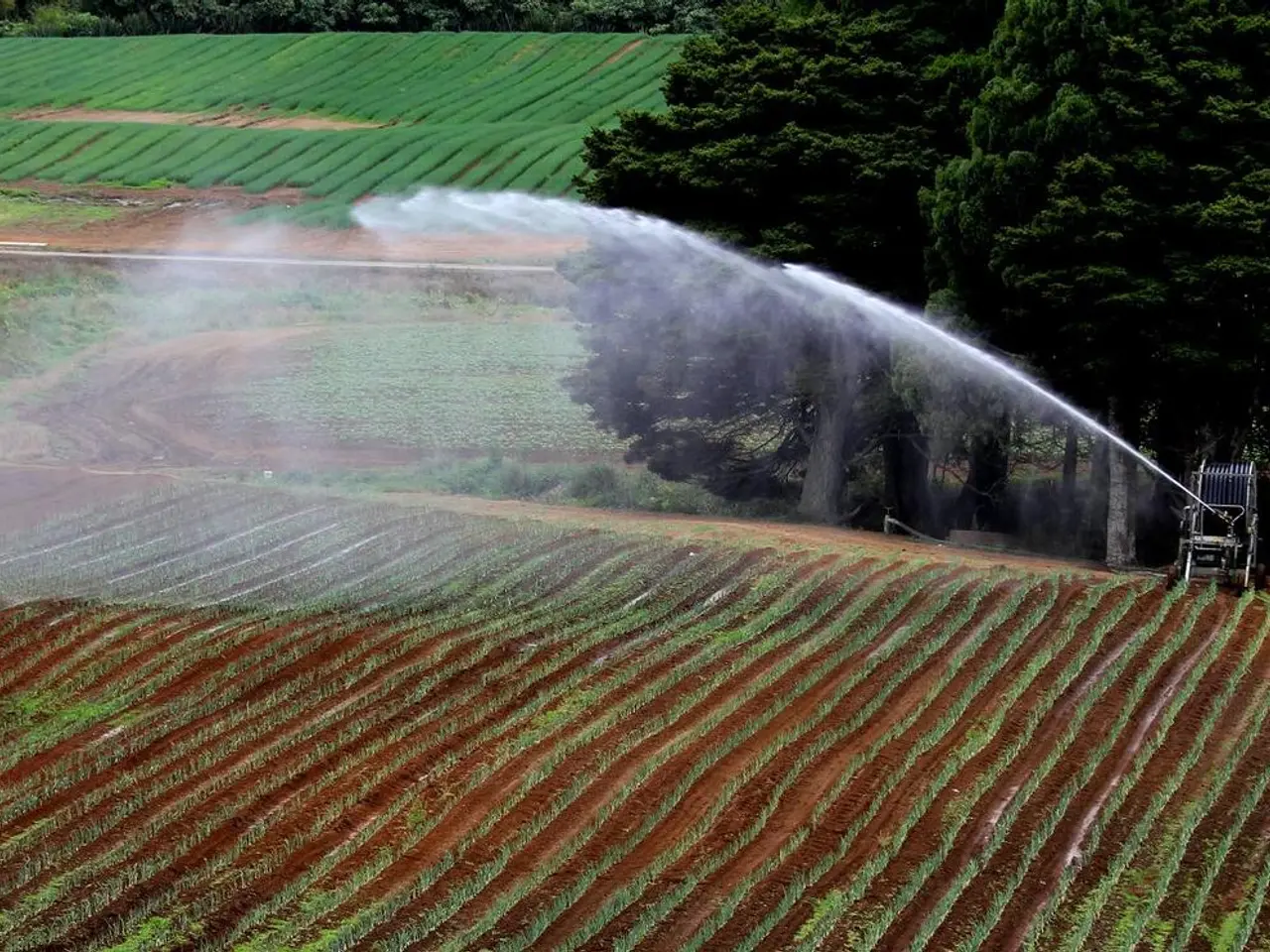Water-Saving Farming Methods Prove Effective in Dry Areas
In arid regions where water is a precious resource, farmers are turning to sustainable farming techniques to optimize their limited water resources and ensure the success of their crops. These methods, including drip irrigation, crop rotation, rainwater harvesting, and more, help farmers manage water more efficiently and protect the environment.
One of the most effective methods for water conservation is drip irrigation. This efficient irrigation system delivers water directly to the roots of plants, minimizing evaporation and runoff, and improving water use efficiency dramatically compared to traditional irrigation methods [1][4].
Crop rotation and cover cropping are other valuable practices. Enhancing soil organic matter and structure, these techniques improve water retention in soil and reduce evaporation. They also help maintain soil fertility without excessive irrigation [1][2][3].
Rainwater harvesting is another essential technique. By collecting and storing natural rainfall for later use, farmers can reduce their dependence on other water sources and ensure availability during dry spells [1].
Selecting drought-resistant crops is another key strategy. These plants, such as sorghum, millet, and quinoa, can survive with little water, having special features that help them thrive in dry conditions [1][3]. By growing these crops, demand for water can be reduced, especially in areas where it is limited.
Soil conservation practices, including mulching, agroforestry, strip cropping, contour bunding, terraces, check dams, and trenches, help reduce surface runoff and soil erosion, keeping soil moisture intact for crop use [2][3].
Conservation tillage, or no-till/minimum tillage, is another crucial practice. Minimizing soil disturbance preserves organic matter and soil structure, which enhances moisture retention and reduces irrigation needs [2][3].
Precision agriculture and scheduling, using data-driven insights, satellite monitoring, and irrigation scheduling based on plant water needs and weather conditions, prevent over-irrigation and wastage, improving overall water efficiency [3][4].
Watering at the right time, either in the early morning or late afternoon, also reduces evaporation. Moreover, using mulch around plants keeps the soil moist and reduces the need for watering [1].
By implementing these sustainable farming techniques, farmers in arid regions can maximize crop yield per unit of water used, improve soil health to retain moisture, reduce water loss through evaporation or runoff, and adapt to climate variability. These practices support long-term sustainable agriculture by conserving water resources critical to farming success in dry environments [1][2][3][4].
In conclusion, sustainable farming techniques are not only beneficial for farmers in arid regions but also essential for the future of agriculture in these areas. By embracing these practices, farmers can conserve water, protect the environment, and ensure the long-term success of their crops.
- The quality of crops in arid regions can be improved through science-backed sustainable farming techniques.
- Efficient use of water resources is crucial for the success of farming businesses in dry climates.
- Renewable energy sources, such as solar panels, can be integrated into farming operations to reduce reliance on fossil fuels and lower costs.
- Environmental science plays a vital role in developing sustainable farming practices that protect the environment and conserve resources.
- Financial investments in sustainable farming are crucial for the growth and development of the agricultural industry.
- Lifestyle choices, such as adopting sustainable living practices, can help reduce water consumption and promote environmental stewardship.
- In addition to water conservation, sustainable farming practices can improve soil health and reduce erosion.
- Careers in the environmental industry, such as agronomy and soil science, are essential for the advancement of sustainable agriculture.
- Online education platforms offer opportunities for lifelong learning and skill development in sustainable agriculture.
- Data and cloud computing technologies can be used to optimize irrigation systems and improve water use efficiency.
- Housing markets in arid regions may benefit from sustainable housing designs that conserve water and reduce energy consumption.
- Real estate investors should consider sustainable practices in their development projects to meet growing demand for eco-friendly homes.
- Mindfulness practices, such as meditation and yoga, can help farmers manage stress and make informed decisions about their farming operations.
- Career development in the realm of sustainable agriculture and renewable energy can lead to rewarding occupations with positive impacts on the environment and the housing market.




